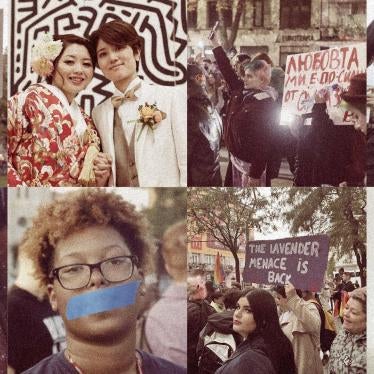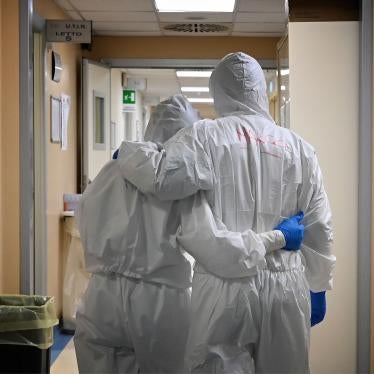Needless restrictions on condoms and HIV/AIDS information are undermining the global fight against the epidemic, Human Rights Watch charged today in a paper released today on World AIDS Day. Condoms remain the single most effective device against sexually transmitted HIV, yet they face government-imposed constraints in numerous countries across the globe.
The 30-page briefing paper documents censorship of information about condoms in government-funded programs, myths about condoms spread by religious leaders, and restrictions on condoms in numerous countries. In some places, police confiscate condoms from AIDS outreach workers and use them as evidence of illegal prostitution or sodomy.
“Governments should be promoting condom use, not treating condoms like contraband,” said Jonathan Cohen, a researcher with Human Rights Watch’s HIV/AIDS Program. “The clear result of restricting access to condoms will be more lives lost to AIDS.”
The World Health Organization and other international health agencies share the broad consensus that condoms used correctly are highly effective in preventing the sexual transmission of HIV. While condoms are clearly not a complete solution to HIV/AIDS, international agencies agree that providing complete and accurate information about the proper use of condoms to reduce the risk of HIV transmission is an essential part of the limited anti-HIV arsenal.
But government-sponsored programs of many countries — including India, Nigeria, Peru and the United States — restrict access to these anti-HIV tools. In 2003, less than half of all people worldwide at risk of sexual transmission of HIV had access to condoms. Even fewer had access to basic HIV/AIDS education. Where school-based HIV/AIDS programs exist, they often conceal information about condoms for fear of promoting promiscuity or birth control.
The United States, the world’s leading donor to HIV/AIDS programs, continues to ramp up its support for “abstinence until marriage” HIV-prevention programs that stress condoms’ very low failure rate, rather than their effectiveness in preventing HIV infection. When used correctly and consistently, condoms provide nearly 100-percent protection against HIV.
 |
| © 2004 Yael Gottlieb/Human Rights Watch |
“In the U.S., the Bush Administration is spending millions of dollars on abstinence-only programs that mislead people at risk of HIV/AIDS about the effectiveness of condoms,” said Rebecca Schleifer, a researcher with Human Rights Watch’s HIV/AIDS Program. “Exporting these programs to countries facing even more serious HIV/AIDS epidemics will only make the situation worse around the world.”
In many countries, political and religious leaders make public statements associating condoms with sin or sexual promiscuity, or providing misleading information about condoms’ effectiveness. The Vatican explicitly objects to condom use and has publicly distorted scientific information about condoms. Senior Vatican officials have blamed condoms for the spread of HIV/AIDS. They have made false scientific claims suggesting that HIV can permeate microscopic pores in condoms — a claim that flies in the face of science.
Nongovernmental organizations in many countries offer a critical source of HIV/AIDS information and condoms, especially to marginalized groups like sex workers and men who have sex with men. But police harassment of frontline HIV/AIDS educators in countries like India and Bangladesh undermines this important work. In some cases, police treat the provision of condoms to men who have sex with men as an act abetting sodomy, which is criminalized under colonial-era laws in numerous countries. Police also use the possession of condoms to justify harassment of those who encourage sex workers to use condoms.






